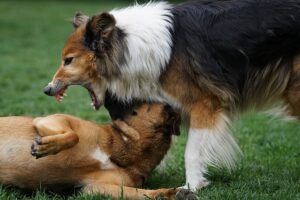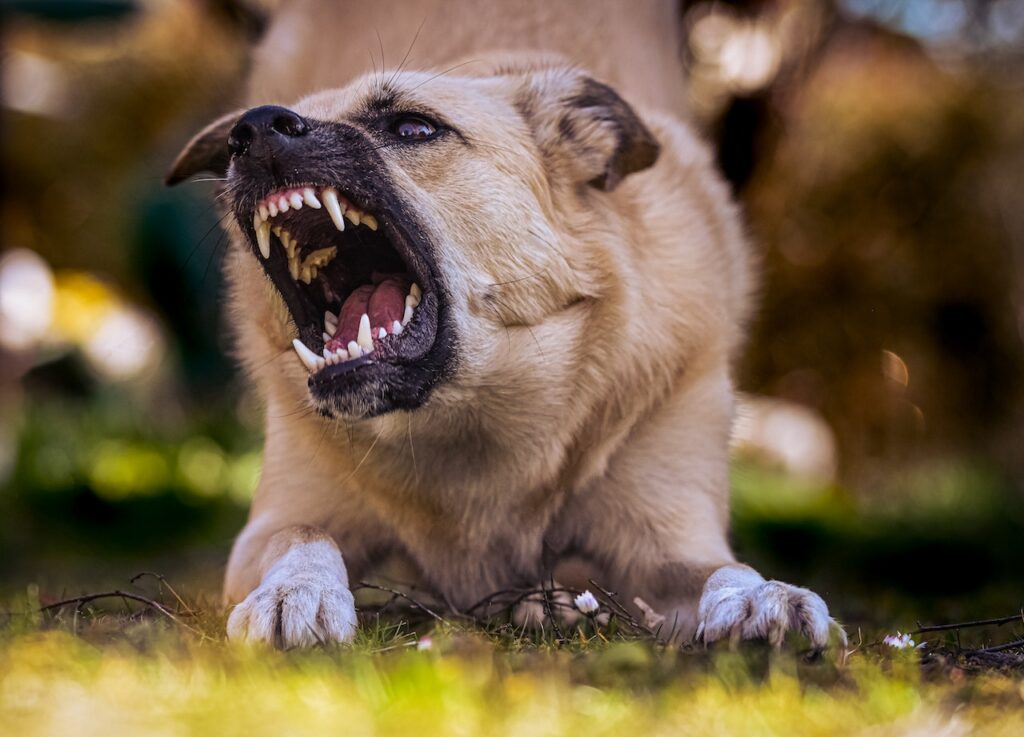So you’re thinking about bringing home a furry friend or you’ve recently added a wagging tail to your family? That’s fantastic! But hold onto your leash because there are some vital things to understand. Dogs, just like people, come with a variety of temperaments, quirks, and potential challenges, one of which could be aggression.
But what factors may cause your pooch to show signs of aggression? Buckle up as we embark on a journey exploring the dog-eat-dog world of canine aggression triggers and how you can manage them effectively.
Table of Contents
Lack of Proper Socialization
First off, we need to talk about socialization, or rather, the lack of it. Early socialization for our four-legged friends is like the ABCs for children—critical for their behavioral development. Puppies that don’t get to sniff out the world and meet various people, animals, and environments may grow up anxious, fearful, and ultimately aggressive.

So, how do you ensure your puppy is socialized properly?
Simple! Regular play dates with other dogs, exposure to different environments and people, and positive reinforcement will help lay the foundation for a well-rounded canine citizen. However, remember, inadequate socialization could have your pooch barking up the wrong tree and manifesting aggressive behaviors.
Fear and Anxiety Triggers
Next up on the dog-aggression mystery tour are fear and anxiety triggers. Remember how you jumped out of your skin watching that last horror movie? Our furry friends have their fear triggers too, like loud noises, unfamiliar environments, or traumatic experiences, which could trigger aggression. As a fur parent, it’s essential to understand your dog’s anxiety triggers and create strategies to help them cope.
This could mean using soothing sounds to mask loud noises or gradual exposure to new environments. With time and patience, your pooch will be braver than Lassie!
Inadequate Training and Behavioral Management
Just like kids, dogs need boundaries, and guess who’s in charge of setting those? Yes, you! Training and behavioral management play pivotal roles in preventing aggression. Lack of clear boundaries, inconsistent training, or ineffective discipline can confuse your pooch, leading to frustration and aggression. But don’t worry, it’s not rocket science!
Positive reinforcement training methods, like rewarding good behavior with treats or praise, can work wonders. Remember, you’re not a drill sergeant, but a guide for your dog.
So, keep the training sessions fun, consistent, and filled with love!
Medical Issues and Pain
Imagine having a pounding headache and not being able to express it verbally. Tough, right? Our canine friends may face a similar plight. Undiagnosed medical conditions or chronic pain can lead to aggression in dogs. Regular vet check-ups can help nip any potential medical issues in the bud and ensure your dog isn’t just being aggressive but crying out for help.
As they say, prevention is better than cure, and regular check-ups are a proactive step towards keeping aggression at bay.
Resource Guarding
Ever noticed how your pooch turns into a fierce lion while guarding its food, toys, or personal space? That’s resource guarding for you, another potential reason for aggression. Understanding why your dog is displaying such behavior can help manage it effectively.
Through positive reinforcement and behavior modification techniques, you can teach your dog to remain calm, even if someone approaches their favorite chew toy!
Lack of Proper Exercise and Mental Stimulation
Here’s food for thought – A tired dog is a good dog! Lack of adequate physical exercise and mental stimulation can lead to pent-up energy and frustration, which could potentially make your dog’s aggression go through the woof! The solution is simple and fun – regular walks, playtime, and mental stimulation activities like puzzles and obedience training can ensure your dog is physically tired and mentally content.
Remember, all work and no play makes Rover a grumpy dog!
Negative or Traumatic Experiences
Trauma or negative experiences such as abuse or neglect can leave lasting impressions on dogs, leading to aggression. Rehabilitating a dog that has experienced trauma requires patience, love, and often professional help. It’s vital to provide a safe, positive environment for the dog to heal, showing them that not all humans are bad news.
A dog recovering from trauma is like a broken bone, with time, the right care, and some love; it will heal.
Breed-Specific Considerations
While we believe that every dog is unique, certain breed-specific tendencies may contribute to aggression. For instance, some breeds might be more prone to resource guarding while others to fear-based aggression. Knowing your dog’s breed characteristics and tailoring your training accordingly can go a long way in preventing aggression.
Remember, every dog has its day, and with the right approach, your dog’s day will be filled with wags and licks, not growls and nips!
Key Takeaways:
- Proper early socialization is essential in preventing dog aggression.
- Understanding your dog’s fear and anxiety triggers can help manage their aggressive behavior.
- Training and behavioral management play a significant role in preventing aggression in dogs.
- Regular veterinary check-ups can help identify any potential medical triggers for aggression.
- Resource guarding, lack of exercise, and mental stimulation can contribute to dog aggression.
- Negative or traumatic experiences can lead to aggression in dogs.
- Understanding breed-specific tendencies can help tailor training and manage potential aggression.
Conclusion
Phew, that was quite a walk, wasn’t it? Navigating the terrain of dog aggression can seem daunting, but understanding these triggers can make the journey smoother. Remember, our four-legged friends aren’t born aggressive; their experiences shape them.
By ensuring proper socialization, understanding their fear triggers, providing adequate training, exercise, and addressing medical issues promptly, you can have a happy, well-adjusted dog.
And if you ever find yourself lost, remember, professional help is just a phone call away!


Dennis and Becca, have always shared a passion for man’s best friend. As dog enthusiasts, they put together articles that inform, engage, and captivate fellow dog lovers.